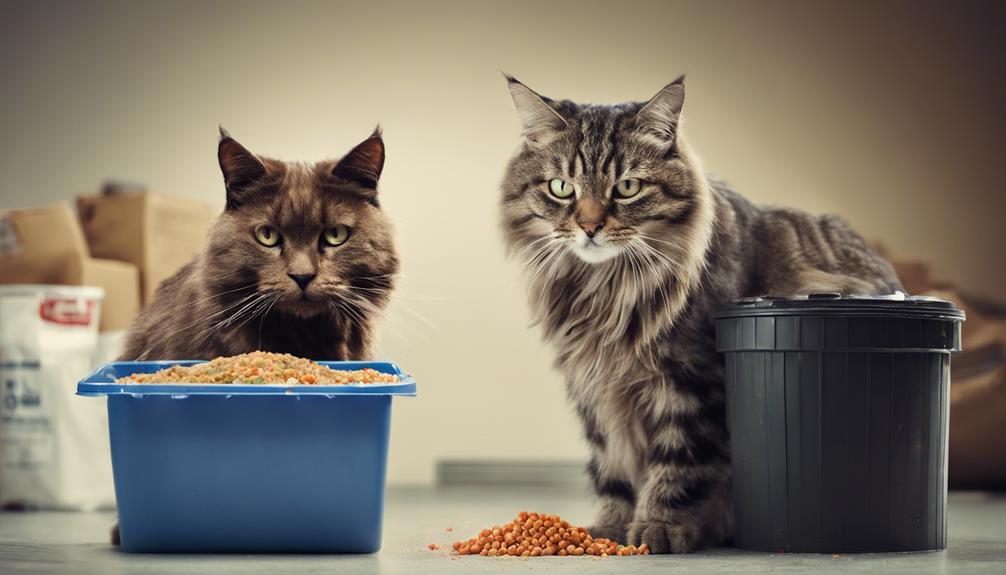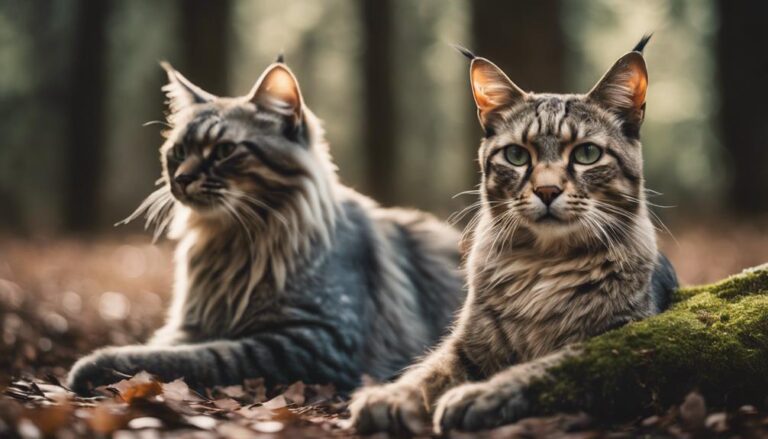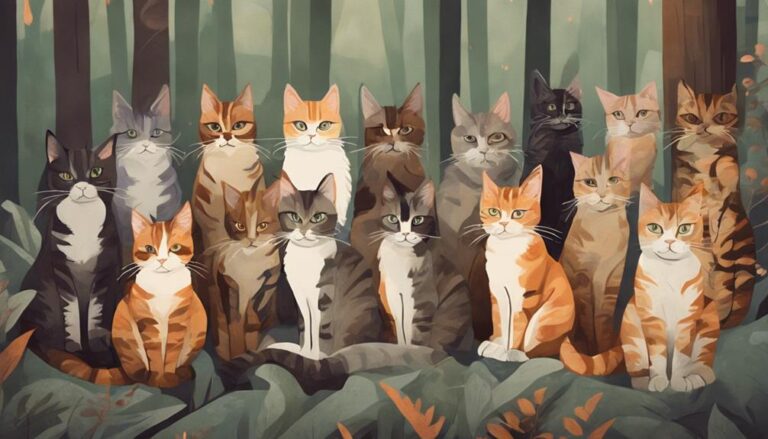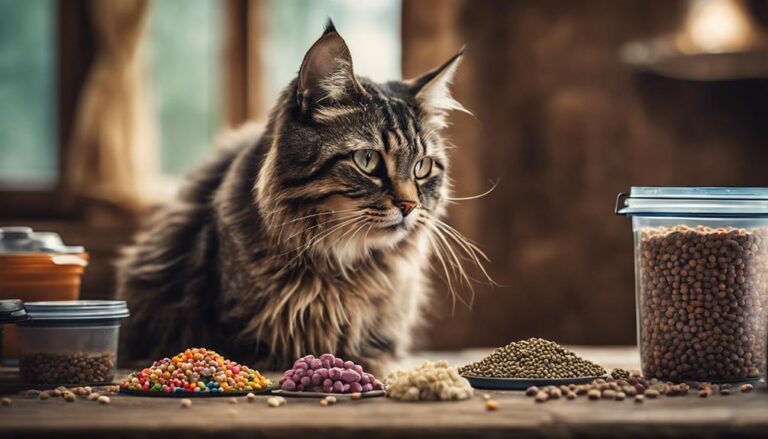As you scan the ingredient list of your cat's food, you might come across 'ash content' – but what does it really mean for your pet's health? You're not alone in wondering if high ash content is a red flag. The truth is, excessive ash can have serious consequences, from urinary tract issues to kidney strain. But before you start making changes to your cat's diet, verifying the role ash plays in their nutrition is crucial. The question is, what's the ideal amount of ash, and how can you guarantee your cat is getting what they need without compromising their well-being?
Understanding Ash in Cat Food
When you scan the ingredient list on your cat's food label, you might come across the term 'ash' or 'ash content,' but what exactly does it mean? Ash in cat food refers to the non-digestible, inorganic residue left over after the food is incinerated. This is basically the mineral content of the ingredients, including calcium, phosphorus, and silica. This ash content in pet food is usually measured as a percentage, and it's typically represented as crude ash.
A high ash content in cat food can be particularly concerning for felines prone to urinary issues. Ash can increase the pH levels in your cat's urine, making it more alkaline, which can lead to urinary tract problems. However, you must bear in mind that not all ash is created equal. Some ash comes from beneficial sources like bone meal, which provides vital minerals for your cat's overall health. When evaluating the ash content in your cat's food, look for the source and type of ash, as well as the overall nutrient profile, to verify you're providing the best possible diet for your feline friend.
Benefits and Drawbacks of Ash
You're likely wondering what benefits and drawbacks ash content in cat food brings to the table, and the answer lies in understanding its effects on your cat's overall health. Ash, a natural byproduct of pet food manufacturing, has both positive and negative consequences. On the plus side, ash contains vital minerals like magnesium, which is vital for maintaining healthy bones and muscles. A moderate amount of ash in your cat's diet can support their overall well-being. However, high ash content can lead to issues like urinary tract disease. This is because excessive ash can cause mineral buildup in your cat's urinary tract, leading to painful and potentially serious health problems. As a responsible pet owner, striking a balance between the benefits and drawbacks of ash in your cat's pet food is imperative. By understanding the effects of ash, you can make informed decisions about what you feed your feline friend, ensuring they live a happy and healthy life.
The Importance of Balanced Ash
Maintaining a balanced ash content in your cat's diet is essential, as it directly impacts their overall health and well-being. You see, ash content is necessary for providing essential minerals like calcium, phosphorus, and magnesium that support bone growth and development. A balanced ash content helps to maintain a healthy gut microbiome, supports strong bone growth, and reduces the risk of certain health problems. The ideal ash content range for cats is generally considered to be around 7-8% or lower, although this can vary depending on the individual cat's needs and life stage. A balanced ash content is also pivotal in maintaining a healthy urinary tract, as excessive ash can contribute to the formation of struvite crystals, which can lead to urinary tract disease in male cats. By ensuring your cat's diet has a balanced mineral content, you can help prevent these issues and promote overall health. So, make sure to check the ash content of your cat's food and consult with your vet if you have any concerns.
Ash Content and Urinary Health
Excessive ash content in your cat's diet can wreak havoc on their urinary health, increasing the risk of painful and potentially life-threatening conditions like feline lower urinary tract disease (FLUTD). When your cat consumes high amounts of ash, it can lead to the formation of urinary crystals, which can cause irritation and inflammation in the urinary tract. These crystals can also combine with other inorganic matter to create painful stones that can obstruct the urinary tract. If left untreated, these conditions can lead to severe health issues, including kidney damage and even death.
As a responsible pet owner, it's essential to monitor your cat's ash intake to prevent these urinary health issues. High ash content can also cause your cat to drink more water, leading to more frequent urination, which can be stressful for both you and your pet. By understanding the risks associated with excessive ash content, you can take proactive steps to ensure your cat's urinary health remains optimal.
Choosing the Right Cat Food
When selecting the best cat food for your feline friend, you'll want to weigh a few key factors. You'll need to think about the ash content, as we've discussed, but you'll also want to assess the overall quality of the food. By doing so, you'll be able to make an informed decision that supports your cat's health and well-being.
Ash Content Considerations
As you navigate the complex world of cat food, it's essential to ponder the ash content of your cat's diet, as it can markedly affect their overall health and well-being. Ash content is a pivotal consideration when selecting a high-quality diet, as excessive ash can contribute to urinary tract issues and other health problems in cats. You should aim for a reasonable ash content range of 7 to 8 percent or lower. Significantly, wet food tends to have lower ash content compared to dry kibble. The Association of American Feed Control Officials doesn't regulate ash content, so it's imperative to carefully review product labels. Chelated minerals, which are bound to organic molecules for easier absorption, can help reduce the need for large amounts of ash in cat food, resulting in lower ash content. By taking ash content into account, you can make an informed decision about your cat's diet and reduce the risk of health issues like FLUTD.
Food Quality Matters
You'll want to focus on selecting a high-quality cat food that meets your cat's unique nutritional needs, taking into account factors like protein content, moisture levels, and mineral balance to support overall health and well-being. When it comes to ash content, look for food manufacturers that provide a reasonable range of 7 to 8 percent or lower. In fact, low ash content in cat food, around 4 to 5 percent for kibble and 2 percent for wet food, can be beneficial. Ash in pet food is not inherently bad, as it provides essential minerals for various bodily functions. However, excessive ash can lead to issues like FLUTD. To make informed decisions, review the ingredient list and Guaranteed Analysis section on the pet food bag to understand the ash content of your cat's food. By choosing a high-quality cat food with a balanced mineral profile, you can help support your cat's overall health and reduce the risk of urinary tract issues.
Managing Ash for Optimal Health
When managing ash for peak health, you'll want to focus on maintaining the right mineral balance in your cat's diet. Controlling ash content is vital, and it starts with understanding the ideal ratios of Calcium, Phosphorus, and Magnesium that support your cat's overall well-being. By getting these ratios right, you can markedly reduce the risk of ash-related health issues in your feline friend.
Mineral Balance Matters
Maintaining a delicate mineral balance is essential for your cat's peak health, and managing ash content in their food is a key aspect of achieving this balance. A reasonable ash content range for cats is generally 7 to 8 percent or lower, with low ash content potentially being around 4 to 5 percent for kibble and 2 percent for wet food.
| Mineral | Ideal Ratio |
|---|---|
| Calcium | 1.3 |
| Phosphorus | 1 |
| Magnesium | 0.06 |
A high ash content can lead to an imbalance of minerals in the body, potentially causing health problems. On the other hand, a diet with the proper ratio of calcium, phosphorus, and magnesium can support your cat's overall health. For instance, a high-meat natural raw cat food diet can help support urinary tract health and overall hydration, reducing the risk of mineral imbalances and associated health issues. By keeping ash content in check, you can guarantee your cat gets the right balance of minerals for peak health. Remember, managing ash content is pivotal for maintaining your cat's delicate mineral balance.
Ash Content Control
To guarantee your cat's peak health, control ash content by selecting a high-quality food that meets the ideal mineral ratio, as excessive ash can disrupt this delicate balance. The American Feed Control Officials (AFCO) recommends a maximum ash content of 9.0% on a dry matter basis. When choosing a cat food, look for formulas that prioritize essential minerals and amino acids over fillers that contribute to high ash content.
You should also pay attention to the type of ash in the food. Some ash comes from beneficial sources like bone meal, which provides calcium and phosphorus. However, excessive ash from non-essential sources like dirt, rocks, or other inorganic materials can lead to kidney strain and other health issues. By controlling ash content, you can verify your cat is getting the nutrients they need without the unnecessary extras. Remember, a balanced diet with vital ash levels is pivotal for maintaining your cat's overall health and well-being.
Frequently Asked Questions
How Much Ash Is Too Much in Cat Food?
You're wondering how much ash is too much in cat food, and it's a great question! The ideal amount varies, but generally, you should aim for 7-8% or lower, depending on your cat's individual needs and health status.
Is Ash Harmful to Cats?
You're wondering if ash is harmful to cats, and the answer is, it can be. Ash can cause digestive issues, kidney strain, and even lead to chronic health problems if consumed excessively over time.
Why Does Cat Food Have Ash in It?
You're wondering why cat food has ash in it? Well, ash is a natural byproduct of the food's mineral content, providing essential nutrients like calcium, magnesium, and phosphorus for your cat's overall health and bodily functions.
What Does Ash in Pet Food Mean?
You're wondering what ash in pet food means? Basically, it's the inorganic matter left after burning organic components, providing essential minerals like calcium and phosphorus for your pet's overall health and well-being.






